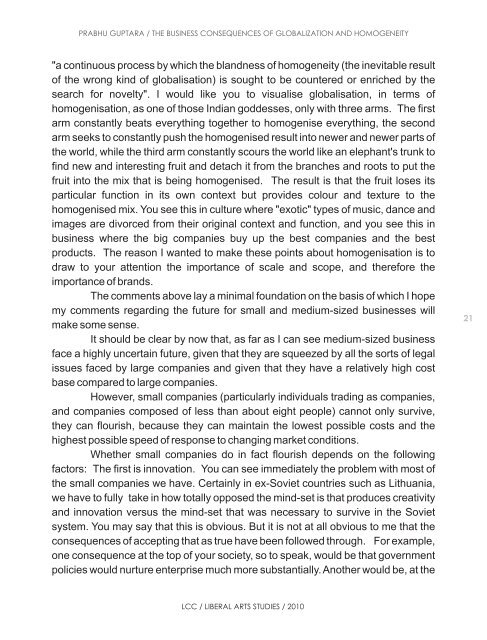lcc liberal arts studies / 2010 volume iii - LCC International University
lcc liberal arts studies / 2010 volume iii - LCC International University
lcc liberal arts studies / 2010 volume iii - LCC International University
Create successful ePaper yourself
Turn your PDF publications into a flip-book with our unique Google optimized e-Paper software.
PRABHU GUPTARA / THE BUSINESS CONSEQUENCES OF GLOBALIZATION AND HOMOGENEITY<br />
"a continuous process by which the blandness of homogeneity (the inevitable result<br />
of the wrong kind of globalisation) is sought to be countered or enriched by the<br />
search for novelty". I would like you to visualise globalisation, in terms of<br />
homogenisation, as one of those Indian goddesses, only with three arms. The first<br />
arm constantly beats everything together to homogenise everything, the second<br />
arm seeks to constantly push the homogenised result into newer and newer p<strong>arts</strong> of<br />
the world, while the third arm constantly scours the world like an elephant's trunk to<br />
find new and interesting fruit and detach it from the branches and roots to put the<br />
fruit into the mix that is being homogenised. The result is that the fruit loses its<br />
particular function in its own context but provides colour and texture to the<br />
homogenised mix. You see this in culture where "exotic" types of music, dance and<br />
images are divorced from their original context and function, and you see this in<br />
business where the big companies buy up the best companies and the best<br />
products. The reason I wanted to make these points about homogenisation is to<br />
draw to your attention the importance of scale and scope, and therefore the<br />
importance of brands.<br />
The comments above lay a minimal foundation on the basis of which I hope<br />
my comments regarding the future for small and medium-sized businesses will<br />
make some sense.<br />
It should be clear by now that, as far as I can see medium-sized business<br />
face a highly uncertain future, given that they are squeezed by all the sorts of legal<br />
issues faced by large companies and given that they have a relatively high cost<br />
base compared to large companies.<br />
However, small companies (particularly individuals trading as companies,<br />
and companies composed of less than about eight people) cannot only survive,<br />
they can flourish, because they can maintain the lowest possible costs and the<br />
highest possible speed of response to changing market conditions.<br />
Whether small companies do in fact flourish depends on the following<br />
factors: The first is innovation. You can see immediately the problem with most of<br />
the small companies we have. Certainly in ex-Soviet countries such as Lithuania,<br />
we have to fully take in how totally opposed the mind-set is that produces creativity<br />
and innovation versus the mind-set that was necessary to survive in the Soviet<br />
system. You may say that this is obvious. But it is not at all obvious to me that the<br />
consequences of accepting that as true have been followed through. For example,<br />
one consequence at the top of your society, so to speak, would be that government<br />
policies would nurture enterprise much more substantially. Another would be, at the<br />
<strong>LCC</strong> / LIBERAL ARTS STUDIES / <strong>2010</strong><br />
21






